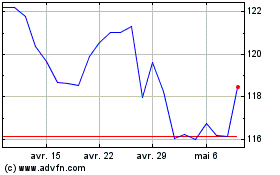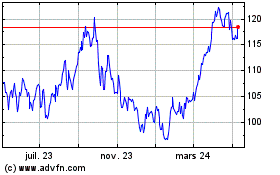Activist Wins Exxon Board Seats After Questioning Oil Giant's Climate Strategy -- Update
27 Mai 2021 - 12:37AM
Dow Jones News
By Christopher M. Matthews
An activist investor's successful campaign to win seats on the
board of Exxon Mobil Corp. represents a historic defeat for the oil
giant, one that will likely force it to more directly confront
growing shareholder concerns about climate change.
Exxon said Wednesday a preliminary vote count showed
shareholders backed two nominees of Engine No. 1, an upstart hedge
fund owning a tiny fraction of the oil giant's stock. The final
vote wasn't tallied as of late Wednesday afternoon, and the final
composition of the board was unclear.
Exxon Chief Executive Darren Woods was also re-elected to the
board along with seven of Exxon's candidates, while the vote was
too close to call for five nominees, the company said.
The vote culminated one of the most expensive proxy fights ever.
It was an enormous blow to Mr. Woods, who personally campaigned
against Engine No. 1.
"We welcome all of our new directors and look forward to working
with them constructively," Mr. Woods said in a statement.
Engine No. 1 sought four seats on Exxon's board and argued the
Texas oil giant should commit to carbon neutrality, effectively
bringing its emissions to zero -- both from the company and its
products -- by 2050, as some peers have.
It nominated four directors -- Gregory Goff, Kaisa Hietala,
Alexander Karsner and Anders Runevad -- and Mr. Goff and Ms.
Hietala were elected Wednesday, according to the preliminary tally.
Mr. Goff is the former chief executive of Andeavor, which was one
the largest U.S. refiners before being purchased for more than $20
billion by Marathon Petroleum Corp. in 2018, while Ms. Hietala is a
former executive vice president of renewable products at Finnish
refiner Neste Oyj.
Engine No. 1 accused Exxon's board of presiding over the
company's demise and argued its own candidates had the
qualifications to help Exxon better navigate the energy
transition.
The hedge fund called for Exxon to gradually diversify its
investments to be ready for a world that will need fewer fossil
fuels in coming decades. Exxon defended its strategy to expand
drilling, saying demand for fuels and plastics will remain strong
for years to come, and pointed to a new carbon capture and storage
business unit as evidence it is taking climate change
seriously.
Peter Bryant, a managing partner at business consultant Clareo,
said Exxon was vulnerable because it hasn't provided a good return
from fossil fuels for years and doesn't get credit from
sustainability-focused investors because it hasn't invested in
renewable energy.
"It's the worst of both worlds," Mr. Bryant said.
Andrew Logan, senior director for oil and gas at Ceres, a
nonprofit focused on sustainability that supported Engine No. 1's
campaign, said it would be difficult for Mr. Woods to retain his
position as CEO after the vote.
"That certainly calls his leadership into question," Mr. Logan
said. "There is no going back to the Exxon of old nor should there
be."
Exxon and Mr. Woods had made a series of changes, long sought by
some investors, since the campaign began, including creating a
business unit for carbon emissions-reducing technologies and
disclosing for the first time the emissions from Exxon
products.
But Engine No. 1 said those moves were inadequate. Despite a
series of calls and meetings, the two sides were unable to agree to
a common set of directors. The fund said Exxon had proposed a deal
of sorts, offering Engine No. 1 in January a chance to rubber-stamp
and take credit for three candidates Exxon later appointed to the
board. Engine No. 1 said it refused.
Exxon said it reviewed Engine No. 1's candidates and determined
they didn't meet the board's standards. In an interview last week,
Exxon lead director Kenneth Frazier said Exxon had asked the fund
to sign a nondisclosure agreement that would have allowed it to
review board candidates Exxon ultimately proposed, but the fund
declined.
Exxon and Engine No. 1 spent much of their time courting
institutional investors. But the company has more than two million
shareholders, many of them individual investors, and they played a
key role in the outcome.
Elizabeth Wilder has owned Exxon stock her entire life after
inheriting it from her grandfather, a former Exxon employee. Ms.
Wilder, a self-described homemaker in Houston, said she previously
always backed management's board nominees. This time, she voted for
three of Engine No. 1's candidates.
"Exxon has failed spectacularly by every available measure:
stock value, relative diminishment of value compared to peers,
capital allocation, environmental stewardship reporting," Ms.
Wilder said. "The people who oversaw the past decade of wealth
destruction should be held accountable."
Write to Christopher M. Matthews at
christopher.matthews@wsj.com
(END) Dow Jones Newswires
May 26, 2021 18:32 ET (22:32 GMT)
Copyright (c) 2021 Dow Jones & Company, Inc.
Exxon Mobil (NYSE:XOM)
Graphique Historique de l'Action
De Juin 2024 à Juil 2024

Exxon Mobil (NYSE:XOM)
Graphique Historique de l'Action
De Juil 2023 à Juil 2024
